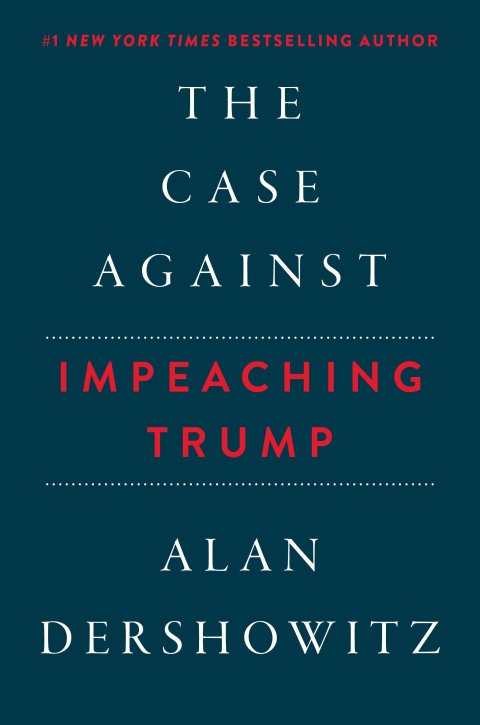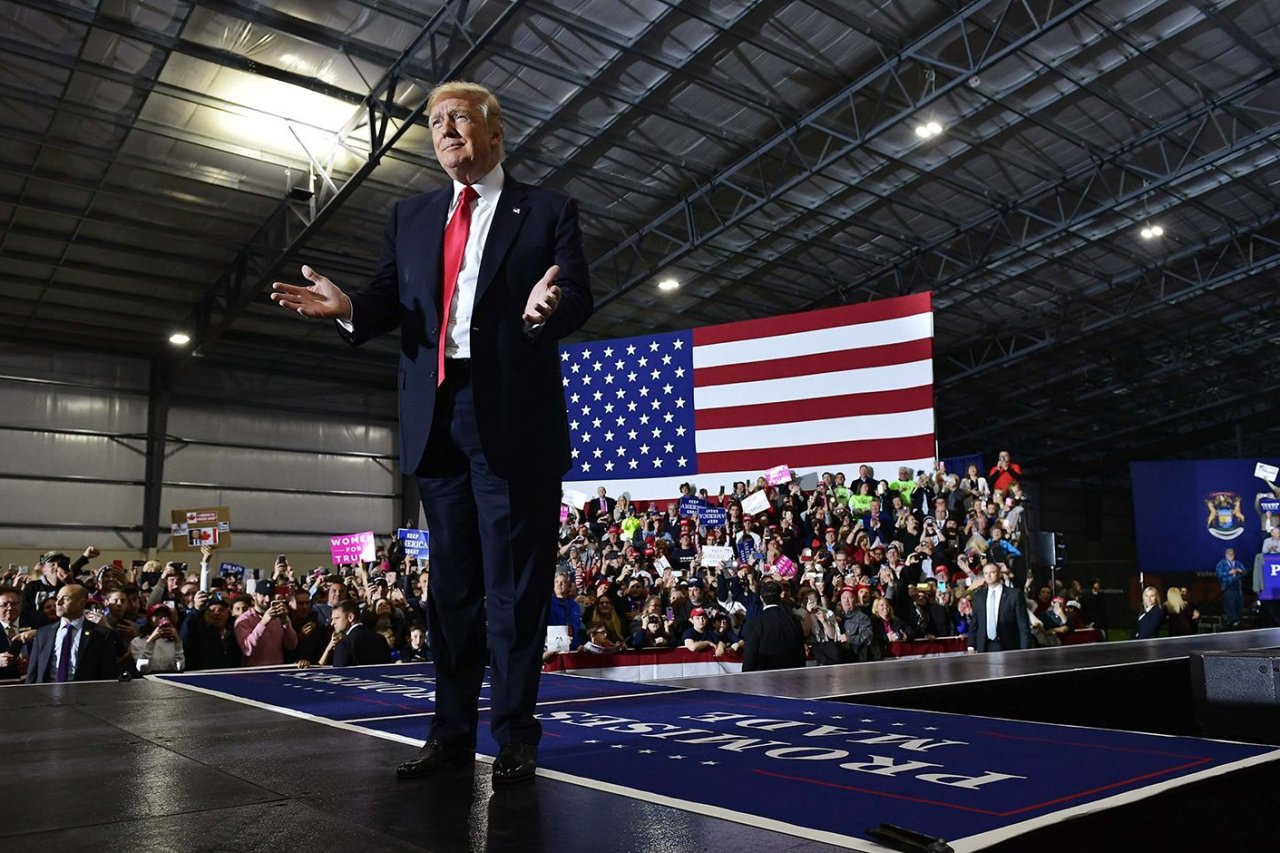Alan Dershowitz is best known for his work with high-profile clients like O.J. Simpson, Mike Tyson, Patty Hearst and Claus von Bülow (whose murder conviction he got overturned in 1985; Dershowitz's best-selling Reversal of Fortune followed). But the Harvard Law Professor is gaining notoriety and criticism, among fellow Democrats, for something else: His views regarding President Donald Trump. Dershowitz has clearly stated that he does not support his agenda. Rather, he is defending his civil liberties, as he would anyone's, a view laid out in his new book.
Dershowitz is first and foremost a scholar of constitutional law. Among his positions: That Trump, as head of our "unitary executive" branch, has the right and authority to order the attorney general and FBI director to investigate and potentially charge a person with crimes—or drop the matter altogether. These are not powers that Dershowitz approves of; he would be in favor of eliminating them. "But," he writes, "I believe that the Constitution, as written and interpreted for generations, allows for them and precludes him from being charged for exercising them—even for exercising them wrongly or in a self-serving manner."
As Dershowitz has long maintained, there is a difference between what we believe the law to be and what it should be, especially when it comes to charging a president with a crime or impeachable offense—a position he addressed during the impeachment of President Bill Clinton: "The time has come to recognize that the framers of our Constitution made a serious mistake by creating the single office of attorney general to serve two conflicting functions. We must bring ourselves into the 21st century by breaking these two functions into two discrete offices, the way the rest of the democratic world has done."
But that, he argues, has yet to happen. The following is an excerpt from The Case Against Impeaching Trump.
What if President Donald Trump were to be impeached for colluding with Russia during the presidential campaign? If there were proof of such collusion—and to date I have seen none—that would be a serious political sin. An American should not collude with a foreign power, especially a hostile foreign power, in an effort to enhance his candidacy. But there is a dispositive difference between a political sin and a high crime and misdemeanor. There is no such crime of collusion in the context of an election. Collusion may entail other crimes, such as election law violations or accessory to crimes such as hacking. But collusion itself is simply not a crime.
Consider the most extreme hypothetical: Assume, absurdly, that candidate Trump called Vladimir Putin and said the following: "Hey, Vlad. Do I have a deal for you? I want to be elected president, and you want to get rid of the Magnitsky sanctions, which I don't like anyway. You should help me get elected by giving me dirt you already have on Hillary Clinton because, if I'm elected, there's a better chance to get rid of the sanctions, which I disapprove of."
Of course, no such conversation occurred, and no such deal was made. But if it had been, one can search the federal criminal statutes for a crime that would cover this political sin. Politicians often seek contributions and support from individuals who expect to benefit from the election of their candidate. There are, of course, limitations on what a foreign government can contribute to a campaign, but these limitations are vague and subject to constitutional scrutiny, especially in the context of information rather than cash.
Perhaps some election laws could be stretched to fit this conduct, but such stretching would raise serious constitutional issues. Obviously, if one varies the facts a little bit, there would be a crime. For example, if a candidate asked Putin to get dirt on his opponent by hacking emails, that would be a crime. But merely passing along dirt that has already been obtained would not be. That is true even if the dirt had been obtained illegally through hacking. The person doing the hacking would be guilty of the crime, but the campaign would not be guilty of using the fruits of the hacking, any more than The New York Times and The Washington Post would be guilty of publishing the Pentagon Papers or the materials stolen by Chelsea Manning and Edward Snowden. So, based on what we now know, it would seem clear that Trump could not be charged criminally with colluding with Russia, even if there were evidence that he did so.

But what if he were impeached for the political sin of colluding with a hostile foreign power? Such impeachment would raise the issue dramatically of whether Congress could go beyond the criteria for impeachment and removal. I think the answer is no, but there are those who disagree. This would be a good test case because, plainly, collusion with Russia would be a breach of the public trust and fulfill Alexander Hamilton's criteria for impeachment (a clause in the Constitution).
Or take a more extreme example. Assume Putin decides to "retake" Alaska, the way he "retook" Crimea. Assume further that a president allows him to do it, because he believed that Russia has a legitimate claim to its original territory. That would be terrible, but would it be impeachable? Not under the text of the Constitution. (It would, of course, be different if he did it because he was paid or extorted.) Such a dramatic event might appropriately result in a constitutional amendment broadening the criteria for impeachment, but it would not justify ignoring or defying the words of our current Constitution.
The framers of the Constitution did not provide an impeachment remedy for an incompetent, nasty, even tyrannical president—unless he committed a designated crime. Perhaps they should have, but Congress is not authorized to "correct" constitutional errors or omissions through unconstitutional actions in impeaching and removing a president who has not committed a designate crime. Perhaps the framers should have required a majority vote rather than a two-thirds vote to assure that a tyrannical president is removed. But the remedy lies in amending the Constitution, not violating it. The appropriate response to executive tyranny is not legislative tyranny.
As I write these words, more information seems to be emerging from both sides regarding improprieties during the campaign. I doubt we have heard the last of the allegations from either side. The bottom line is that the 2016 presidential campaign was deeply troubling for many reasons. That is why, from day one, I proposed that instead of appointing a special counsel to investigate crimes, Congress should have appointed a nonpartisan commission of experts to investigate the entirety of the 2016 election, including allegations of Russian interference, the impact of former FBI Director James Comey's ill-advised public statements, the bias of some FBI agents, and other possible improprieties that do not rise to the level of indictable or impeachable crimes.
I continue to urge the appointment of such a commission since many in the public are losing faith in the Mueller investigation and in the hyper-partisan congressional committee investigations. The public has the right to know everything that happened during the 2016 presidential campaign in order to prevent recurrence in future campaigns. A nonpartisan commission is a far better way to learn the whole truth than any of the investigations currently being conducted.
In making the case against impeaching Trump, I do not mean to whitewash anyone's conduct. I simply want to make sure that whatever actions are contemplated or taken are consistent with the United States Constitution, the rule of law and civil liberties. Unlike the political case against impeaching Trump that Comey is making—voting him out is more democratic than impeaching him—my case against impeaching Trump is constitutional. There is simply no evidence in the public record that he has committed any of the crimes enumerated in the Constitution as a prerequisite for removal.

I am not making the case for Trump's re-election. Every citizen must make that political decision for him or herself. I would be making the same case against impeachment had Hillary Clinton won and it was the Republicans who were urging her impeachment or prosecution for acts that did not constitute crimes. For me, the test has always been "the shoe on the other foot." What criteria would you advocate if she or Bernie Sanders had been elected and was being investigated? I insist that the criteria be the same.
Of course, partisans always argue that the shoe doesn't fit: Partisan Democrats insist that Trump's conduct is more impeachable than Clinton's, and partisan Republicans think Clinton's is more impeachable than Trump's. That's not the point. The point is to agree on neutral criteria that would be equally applicable to all presidents.
Even if I thought impeachment would better serve the interests of democracy, I would oppose Trump's impeachment unless the criteria explicitly enumerated in the Constitution were proved beyond a reasonable doubt, following an impeachment and trial at which all relevant substantive and procedural protections were accorded the president. No one is above the law, but neither is anyone—including the president—beneath the law.
If a controversial president is denied constitutional protections, then any citizen can be denied constitutional protections.
Excerpted with permission from The Case Against Impeaching Trump by Alan Dershowitz. Copyright 2018 by Hot Books, an imprint of Skyhorse Publishing Inc.












